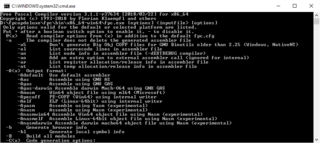| Developer(s) | DJ Delorie |
|---|---|
| Operating system | DOS |
| Type | Compiler |
| License | GNU GPL |
| Website | www |
DJGCC (DJ's GNU Compiler Collection [1] ) is a C development suite for x86 PCs that runs under DOS or compatibles. It is guided by DJ Delorie, who started the project in 1989. It is a port of the popular gcc compiler.

Cygwin is a POSIX-compatible programming and runtime environment that runs natively on Microsoft Windows. Under Cygwin, source code designed for Unix-like operating systems may be compiled and run natively with minimal modification.
The GNU Compiler Collection (GCC) is a compiler system produced by the GNU Project supporting various programming languages. GCC is a key component of the GNU toolchain and the standard compiler for most projects related to GNU and Linux, including the Linux kernel. The Free Software Foundation (FSF) distributes GCC under the GNU General Public License. GCC has played an important role in the growth of free software, as both a tool and an example.

Allegro is a software library for video game development. The functionality of the library includes support for basic 2D graphics, image manipulation, text output, audio output, MIDI music, input and timers, as well as additional routines for fixed-point and floating-point matrix arithmetic, Unicode strings, file system access, file manipulation, data files, and 3D graphics. The library is written in the C programming language and designed to be used with C, C++, or Objective-C, with bindings available for Python, Lua, Scheme, D, Go, and other languages. Allegro comes with extensive documentation and many examples.
uniq is a utility command on Unix, Plan 9, Inferno, and Unix-like operating systems which, when fed a text file or STDIN, outputs the text with adjacent identical lines collapsed to one, unique line of text.
DICT is a dictionary network protocol created by the DICT Development Group. It is described by RFC 2229, published in 1997. Its goal is to surpass the Webster protocol and to allow clients to access more dictionaries during use. DICT servers and clients use TCP port 2628.
A cross compiler is a compiler capable of creating executable code for a platform other than the one on which the compiler is running. For example, a compiler that runs on a Windows 7 PC but generates code that runs on Android smartphone is a cross compiler.

DJ's GNU Programming Platform (DJGPP) is a software development suite for Intel 80386-level and above, IBM PC compatibles which supports DOS operating systems. It is guided by DJ Delorie, who began the project in 1989. It is a port of the GNU Compiler Collection (GCC), and mostly GNU utilities such as Bash, find, tar, ls, GAWK, sed, and ld to DOS Protected Mode Interface (DPMI). Supported languages include C, C++, Objective-C/C++, Ada, Fortran, and Pascal. DJGPP was described as an "aging" product in 2004.
MinGW, formerly mingw32, is a free and open source software development environment to create Microsoft Windows applications. The development of the MinGW project has been forked with the creation in 2005–2008 of an alternative project called Mingw-w64.

Free Pascal Compiler (FPC) is a compiler for the closely related programming-language dialects Pascal and Object Pascal. It is free software released under the GNU General Public License, with exception clauses that allow static linking against its runtime libraries and packages for any purpose in combination with any other software license.

wc is a command in Unix, Plan 9, Inferno, and Unix-like operating systems. The program reads either standard input or a list of computer files and generates one or more of the following statistics: newline count, word count, and byte count. If a list of files is provided, both individual file and total statistics follow.
A DOS extender is a computer software program running under DOS that enables software to run in a protected mode environment even though the host operating system is only capable of operating in real mode.
PMODE is a DOS extender used in several IBM PC compatible DOS applications in the mid and late 1990s. It was created by Thomas "Tran" Pytel, and the first version became publicly available in 1994. The original PMODE was written to be used with programs written in x86 assembler, specifically using Borland's TASM. It was later expanded for use as a drop-in replacement for DOS/4GW under the name PMODE/W.

Arachne is a discontinued Internet suite containing a graphical web browser, email client, and dialer. Originally, Arachne was developed by Michal Polák under his xChaos label, a name he later changed into Arachne Labs. It was written in C and compiled using Borland C++ 3.1. Arachne has since been released under the GPL as Arachne GPL.
process.h is a C header file which contains function declarations and macros used in working with threads and processes. Most C compilers that target DOS, Windows 3.1x, Win32, OS/2, Novell NetWare or DOS extenders supply this header and the library functions in their C library. Neither the header file nor most of the functions are defined by either the ANSI/ISO C standard or by POSIX.
conio.h is a C header file used mostly by MS-DOS compilers to provide console input/output. It is not part of the C standard library or ISO C, nor is it defined by POSIX.
CWSDPMI is a 32-bit DPMI host written by Charles W. Sandmann from 1996 to 2010, currently at r7. It is loosely based upon prior GO32.EXE code used in DJGPP v1. It can provide DPMI 0.90+ 32-bit services for programs compiled with latest versions of DJGPP etc. compilers. Since r5, it can also be used for programs requiring a DPMI stub in lieu of PMODE/DJ. It supports up to 4 GB, virtual memory, and hardware interrupt reflection from real mode to protected mode. Programs compiled with DJGPP v2 require a DPMI host, which is usually CWSDPMI.EXE or CWSDPR0.EXE. In case of CWSDPMI.EXE, the default paging/virtual memory file is C:\CWSDPMI.SWP. It is capable of running on a 386 in under 512 KB of RAM.
SETEDIT is an open source, multi-platform clone of the editor of Borland's Turbo* IDEs, with several improvements. According to the project page, it was started in 1996. It is not vi or emacs, but may be familiar to DOS users, as noted in reviews. It is the editor used by RHIDE.
EMX is a programming environment for MS-DOS and OS/2. It allows creating and executing of 32-bit mode applications, presenting a POSIX API and, on OS/2, access to the OS/2 APIs.

DR-WebSpyder is a DOS web browser, mail client and operating system runtime environment that was developed by Caldera UK in 1997. It was based on the DR-DOS operating system and networking components from Novell as well as the Arachne web browser by Michal Polák of xChaos software. The system was designed to run on low-end desktop systems, but being able to boot and execute from disk as well as from ROM or network, it was also tailored for x86-based thin clients and embedded systems with or without disk drives. Using the web browser as its principal user interface, it could be also used for kiosk systems and set-top boxes. Named Embrowser, it has been ported to Linux in 1999 and was called Embedix Browser since 2000.